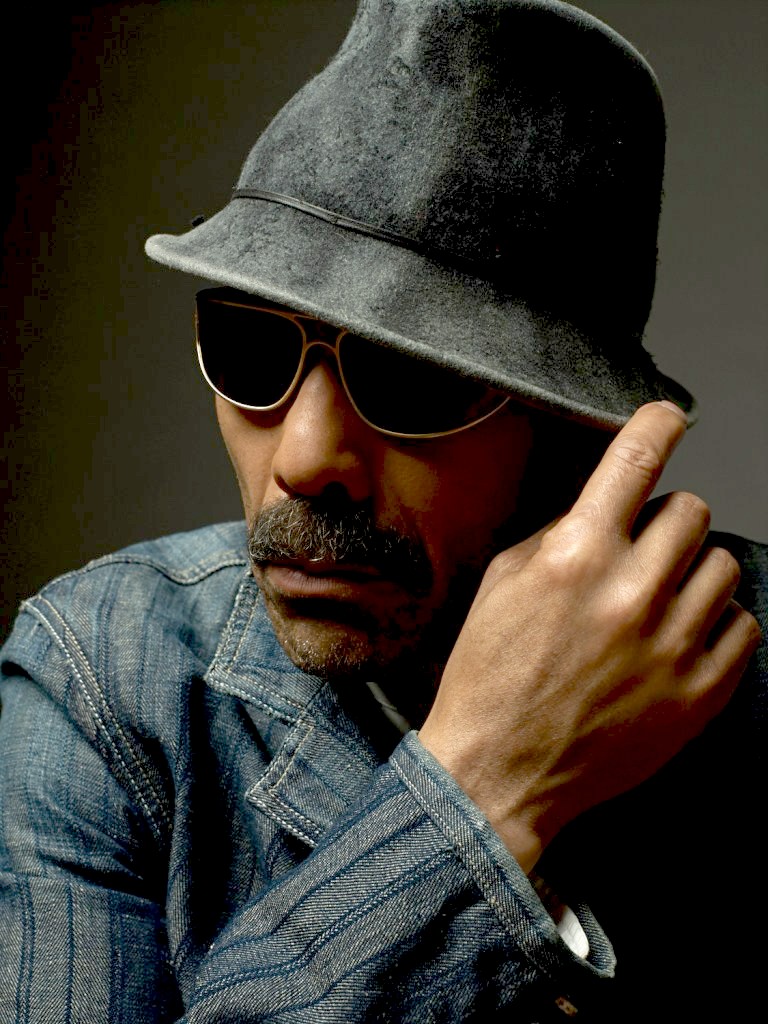Friday Five: Erin Zindle & The Ragbirds, Half Blue, J. Michael & The Heavy Burden, Lonelysaki, And Spiders

Friday Five highlights music by Washtenaw County-associated artists and labels.
This week features fiddle-grunge by Erin Zindle & The Ragbirds, laidback hip-hop by Half Blue, adult rock by J. Michael & The Heavy Burden, dream-pop electronica by Lonelysaki, and lo-fi alt-country by And Spiders.
The Ark’s Ann Arbor Folk Festival Makes Welcome Return to U-M’s Hill Auditorium

After three years away, it felt heartwarming to attend the 46th annual Ann Arbor Folk Festival on January 28.
As a regular past attendee, there was something special about going in-person again to celebrate The Ark’s largest concert and fundraiser of the year.
For once, the entire show occurred before a live audience without any COVID-19 cancellations (aka 2022) or virtual alternatives (aka 2021). (January 27’s sold-out Friday Night Folk: BanjoFest also featured in-person performances with Valerie June, Thao, Yasmin Williams, and Michigan’s Rachael Davis at The Ark’s Ford Listening Room.)
A renewed sense of gratitude filled the air as a lineup of emerging and established folk acts—including Ani DiFranco, St. Paul & The Broken Bones, and Patty Griffin—took the stage at the University of Michigan’s Hill Auditorium for five hours of folk-inspired and folk-adjacent music.
Alongside co-emcees SistaStrings, singer-songwriter Peter Mulvey uttered the words everyone had waited to hear since 2020: “Omigod, we’re finally back!”
Chicago percussionist Kahil El’Zabar brings spiritual energy to Encore Theatre’s "American Songbook" concerts

Kahil El’Zabar has a very clear memory of the greatest performance he ever attended.
“I saw [John] Coltrane at a club called McKee’s in Chicago,” the jazz percussionist and band leader said in a phone interview. “I was 15 and [drummer] Elvin Jones went to sleep while he was playing and never lost a beat. The telepathy, the power of communication and connectivity, of mind and spirit in music, that one moment changed my life because I knew that I would want to be part of that embrace for the rest of my life. I would always search for that moment when you are beyond consciousness and can express something greater than yourself. I hope for that every time. When you do it, it is the most exciting and humbling experience you ever experience.”
El’Zabar and his Ethnic Heritage Ensemble will bring his unique approach to the Encore Musical Theatre in Dexter, Feb. 3-4. Last year at about the same time, El’Zabar and his group performed at Encore’s Modern Jazz Meets Musical Theatre; this year the theme is A Modern Exploration of the American Songbook.
The innovative, award-winning musician will celebrate his 70th birthday and the 50th anniversary of the Ethnic Heritage Ensemble next year. His career has been influenced by both his African heritage and growing up in one of America’s legendary jazz cities, Chicago.
El’Zabar’s music has a rich spiritual component that comes from both his experience in Africa and his exposure to the masters of jazz.
“When I came out of Lake Forest College in ‘73, I had an eight-month residency in Ghana,” he said. “I was at the University of Ghana in a city called Legon. Just how people related on a human level, the connection of touch, not just physical but eye and voice and through performance; it seemed to have this spirit that I wanted to retain in my own music.”
As a teenager in Chicago, he got to know performers like Pharoah Sanders, Coltrane, and the Art Ensemble of Chicago. He admired the energy.
Friday Five: GVMMY, Subcortical, Sean Curtis Patrick, Same Eyes, Asilee Sound Group

Friday Five highlights music by Washtenaw County-associated artists and labels.
This week features forward-looking hip-hop by GVMMY, industrial hip-hop by Subcortical, soundscapes by Sean Curtis Patrick, synth-pop by Same Eyes, and chiptunes by Asilee Sound Group.
Friday Five: Nadim Azzam, Jacob Sigman, Doogatron, Shannon Lee, Kuwento Mizik

Friday Five highlights music by Washtenaw County-associated artists and labels.
This week features singer-songwriter hip-hop by Nadim Azzam, R&B hip-hop via Jacob Sigman, bedroom techno from Doogatron, classic country courtesy of Shannon Lee, and a classical-plus-world-music blend by Kuwento Mizik.
(Re)Introducing Djangophonique: Andrew Brown and Co. are putting a modern spin on a jazz tradition

“When I say ‘modern music,’” says Andrew Brown, “what I mean is, like, anything after 1956.”
Brown is the band leader and lead guitarist for Djangophonique, the crisp Ann Arbor-based quartet that’s made a name for itself reveling in—and updating—the 1930s and 1940s music known as “gypsy jazz,” or jazz manouche. It's a sound primarily associated with the French-Romani guitarist Django Reinhardt, but Djangophonique applies the style to a range of genres, from country music to swing.
In 2020, Djangophonique released a live EP, Jazz Du Jour, some of which was recorded at the Blue Llama Jazz Club, but it came out just before the pandemic began. “That kind of put things on pause for a while,” Brown says.
But the band regrouped and last summer issued its first full-length album, Introducing Djangophonique, which garnered the quartet more and more attention. The group snagged some high-profile gigs, too, including the bluegrass-based Wheatland Music Festival, the Detroit Jazz Festival, and Ann Arbor's Top of the Park. While Djangophonique performs all over the area, its current home base is Ann Arbor's new North Star Lounge, where Brown is the creative director and the group has a residency most Wednesdays.
Friday Five: Iggy Pop, Sara Tea, Giraffe, John Beltran, DJ Emby

Friday Five highlights music by Washtenaw County-associated artists and labels.
This week features rock 'n' roll by Iggy Pop, indie-tronica by Sara Tea, fusiony jazz by Giraffe, progressive techno by John Beltran, and a dance mix by DJ Emby.
Friday Five: KUZbeats, cv313, Alex Anest's Electric Four, AGN7 Audio releases, Sebastian Wing and Gami

Friday Five highlights music by Washtenaw County-associated artists and labels.
This week features soundtrack electronica by KUZbeats, dub techno from cv313, jazz from Alex Anest, and drum 'n' bass from the AGN7 Audio label and Sebastian Wing and Gami.
How Human: Lily Talmers returns to Ann Arbor with two new excellent albums that explore deeply personal and universal experiences

On "My Mortal Wound," the opening song on Lily Talmer's It's Unkind to Call You My Killer album, states in the chorus:
I’m alright; I am
Just the tide’s gone still and I’m left waiting for something to happen
For anything to happen; For good things to happen
Well, good things are happening for the Birmingham native and University of Michigan graduate.
In the past few months, she's released two terrific albums: the aforementioned Killer, an 11-track, stripped-down collection of songs performed live, and Hope Is The Whore I Go To, which features 10 strings-and-brass-colored tunes recorded in studios from Ypsilanti, Michigan to Brooklyn, New York.
Both albums highlight Talmer's exquisite amalgamation of 1960s folk-pop, Eastern European brass bands, and the melancholy melodies of Brazilian and Mediterranean music. Her twang-tinged voice is a slightly untamed powerhouse that's more than capable of delivering her heartfelt, poetic lyrics exploring personal and spiritual relationships with the drama and delicacy they deserve. Think of a jazz singer who hasn't sanded the edges off her voice but can still duck and weave in and out of the music like an instrumental virtuoso. (Canadian cult singer-songwriter Mary Margaret O'Hara is the closest analog to my ears.)
"If Hope Is The Whore I Go To is the primordial scream version of the message I’m trying toward," Talmers says in the interview below, "It's Unkind to Call You My Killer is the inward recoil. I’m telling you something in the first record, and in the second I’m kind of just admitting things to myself."
Since graduating from U-M, Talmers has moved to Brooklyn but makes frequent trips back home, including a stop on Sunday, January 8 at The Ark for her first headline show at the venue.
In 2021 Pulp did an extensive piece on Talmers for her debut full-length release, Remember Me As Holy, and in late summer of this year, former AADL public library associate Katy Trame talked to Talmers about her life and brilliant new records.
—Christopher Porter, Pulp
Everybody's Kranky: In a recorded talk, Bruce Adams discussed his recent book on the rise of Chicago's thriving 1990s independent music scene and the influential record label he cofounded

For a guy who cofounded a record label named kranky—small k, thanks—that used marketing slogans such as "Honk if you hate people, too," Bruce Adams is one of the nicest people in the music industry.
Adams' new book, You're With Stupid: kranky, Chicago, and the Reinvention of Indie Music, recalls not only the rise of his experimental label but also the inventive, genre-hopping sounds that were coming out of the city in the 1990s. It was also a time when major labels swooped into town to sign the likes of The Smashing Pumpkins, Urge Overkill, and Liz Phair after Nirvana showed corporations that the independent music scene could sometimes provide commercial hits.
A former Ann Arbor resident, Schoolkids Records employee, and WCBN-FM DJ, Adams moved to Chicago in 1987 to work for various music-distribution companies. He also worked at the influential Touch & Go Records as a publicist, handling bands such as Ann Arbor's Laughing Hyenas as well as Slint, Die Kreuzen, The Jesus Lizard, and many other bands that took the energy of punk rock and twisted it into new forms of dynamic and frequently very heavy music.
But in 1993, Adams and his colleague Joel Leoschke looked at the stacks of indie-rock CDs and 7-inches flooding into the Cargo Distribution warehouse where they worked and decided they wanted to do something completely different with their record label. The duo took their inspiration from 1970s progressive-music labels such as Editions EG, which counted Brian Eno's transformational ambient albums in its catalog, and ECM Records, which focused on jazz (and classical) that came from a more European approach to improvisation; more open to exploring space and unique timbres rather than blues-informed swing. They also looked toward German kosmische musik of 1970s groups such as Neu! and Cluster as well as then-contemporary psychedelic bands such as Spacemen 3, which played drone-based rock 'n' roll.
Adams and Leoschke wanted kranky to represent music that was artful, hazy, and deep—and they found the perfect first band for their new label: Labradford.
Prazision was the debut album by the Richmond-based duo (later trio) Labradford, which used guitars drenched in reverb, 1970s analog keyboards that weren't popular then, and sung-spoken vocals that blended into the vast smudge of ambient sounds.
The label went on to release albums by godspeed you! black emperor, Stars of the Lid, and kranky's most popular act, Low, the slowcore band fronted by the husband and wife duo of Alan Sparhawk and the recently deceased Mimi Parker. The label still continues to this day, releasing forward-looking music by Grouper and Jessica Bailiff as well as albums by Dearborn's Windy & Carl and Ann Arbor's Justin Walter.
Adams and Leoschke used what they learned from working for indie labels and distribution centers in order to not make the same mistakes they saw happening over and over: treat the bands with respect, pay them, and only release music you love. In the words of American poet Joe Perry, kranky "let the music do the talking."
A lot of music memoirs are filled with gossipy details, but since Adams really and truly is a nice guy, You're With Stupid avoids any deep, dark revelations or pointed barbs. It's more a survey of the vast amount of creative musical endeavors that defined Chicago in the 1990s rather than salacious tales of excess.
Adams discussed You're With Stupid at the Ann Arbor District Library's Downtown branch at 6:30 pm on Thursday, November 17. I was the guy interviewing him, and we talked about the kranky's groundbreaking music and the 1990s Chicago independent music scene.
A video of our chat is below, and for those unfamiliar with the label, Adams picked five tracks and added commentary to introduce new listeners to the kranky sound:


































